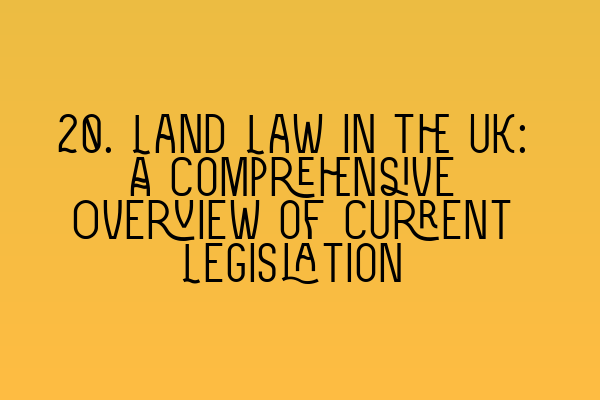Land Law in the UK: A Comprehensive Overview of Current Legislation
Welcome to SQE Property Law & Land Law, where our team of expert solicitors are here to provide you with a comprehensive overview of land law in the UK. Whether you are a property owner, a tenant, or a legal professional looking to expand your knowledge, this article will serve as a valuable resource for understanding the current legislation governing land law.
What is Land Law?
Land law is a branch of law that encompasses the rights, interests, and responsibilities associated with the ownership and use of land. It covers a wide range of topics, including property ownership, leases, mortgages, easements, and more. Land law is essential for ensuring that individuals and businesses have clear and enforceable rights when it comes to land and property.
The Importance of Understanding Land Law
Whether you are buying, selling, or occupying property, it is crucial to have a solid understanding of land law. This knowledge allows you to make informed decisions, protect your interests, and ensure compliance with legal obligations. By understanding the current legislation, you can navigate the complexities of land transactions with confidence and avoid potential disputes or pitfalls.
Current Legislation Governing Land Law
There are several key pieces of legislation that govern land law in the UK. These laws provide a legal framework for property ownership, land registration, and the resolution of disputes. Here are some of the most important acts to be aware of:
1. Land Registration Act 2002
The Land Registration Act 2002 introduced a new system for registering land in England and Wales. Under this act, most land ownership is recorded in the Land Registry, providing a transparent and accessible way to establish ownership and interests in land. This act also sets out the requirements and procedures for registering land and creating legal charges.
2. Law of Property Act 1925
The Law of Property Act 1925 is a foundational statute that governs various aspects of land law. It establishes the legal framework for property ownership, leases, and mortgages. This act also introduced the concept of registered land and statutory formalities for the transfer of land.
3. Landlord and Tenant Act 1954
The Landlord and Tenant Act 1954 provides protections and rights for both tenants and landlords in commercial lease agreements. This act regulates the renewal of leases, rent adjustments, and the grounds for termination. Understanding this legislation is particularly important for both parties involved in commercial leasing transactions.
4. Leasehold Reform, Housing, and Urban Development Act 1993
The Leasehold Reform, Housing, and Urban Development Act 1993 introduced various rights for leaseholders, including the right to extend their lease, purchase the freehold, or collectively manage their building. This act aims to give leaseholders greater control and security over their properties.
How to Stay Up-to-Date with Land Law
As land law is a constantly evolving field, it is essential to stay up-to-date with the latest legislation and developments. Here are some resources and steps to help you stay informed:
1. Legal News Websites
Subscribe to reputable legal news websites that cover land law and property-related topics. These websites often publish articles, analysis, and updates on new legislation and cases that may impact land law.
2. Legal Professional Associations
Join legal professional associations that focus on property or land law. These associations often offer newsletters, conferences, and educational seminars that can keep you informed on current legislation.
3. Continuing Professional Development (CPD)
Attend CPD courses and training programs that specifically cover land law. These courses provide an opportunity to learn from industry experts and stay updated on changes in legislation and best practices.
4. Consult with Legal Experts
If you have specific questions or concerns regarding land law, it is always advisable to consult with a qualified solicitor who specializes in property law. They can provide personalized advice and guidance based on your individual circumstances.
Conclusion
Understanding land law is crucial for anyone involved in property transactions or ownership. By staying informed about current legislation and seeking professional advice when necessary, you can navigate the complexities of land law with confidence and protect your rights and interests.
For more information on SQE Property Law & Land Law, and to explore our range of SQE 1 and SQE 2 preparation courses, please visit our website. We also offer SQE 1 practice exams and SQE 1 practice mocks to help you prepare for your assessment. To stay updated on SRA SQE exam dates and other important information, please visit our exam dates page.
